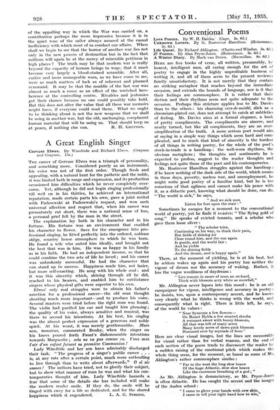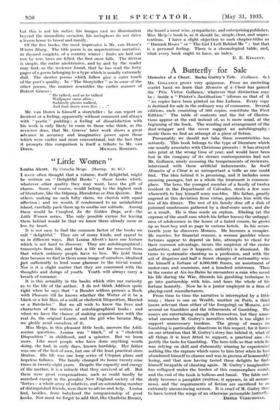Conventional Poems
Love Poems. By W. H. Diiiries: (Cape. Ss. 6d.) A Winter Diary. By Mark van Doren. (Macmillan 8s. (id.) HERE are five books of verse, all written, presumably, by honest, intelligent men, all caring enough for the art of poetry to engage in the highly unprofitable business of writing it, and all of them seem to the present reviewer
faintly unsatisfactory. It is not merely that they contain no striking metaphor that reaches beyond the immediate occasion, and extends the bounds of language, nor is it that their feelings are commonplace. It is rather that their diction and their rhythms seem not quite adequate to the
occasion. Perhaps this stricture applies less to Mr. Davies than to the others : his charming vers-de-societe, slick as a chromium-plated car, does not attempt to catch at subtleties
of feeling. Mr. Davies aims at a formal elegance, a book of pretty compliments. The compliments are sincere, and neatly turned, but like all compliments, they are an over- simplification of the truth. A more serious poet would aim at saying in a simple way things which seem hard and com- plicated, and to reach that kind of sincerity is the hardest of all things in' writing poetry, for the whole of the poet's stock-in-trade is a handicap : the well-worn rhythms, the obvious metaphors ; the thoughts and sentiments he is expected to profess, suggest to the reader thoughts and feelings not quite those of the poet and his contemporaries. Mr. Rostrevor Hamilton struggles against the handicap : if he knew nothing of the dark side of the world, which means in these days, poverty, useless war, and unemployment, he might write good poetry of a familiar kind, but he is too conscious of that ugliness and cannot make his peace with it, as a didactic poet, knowing what should be done, can do.
" The world is sick," he says, • -
" And we sick men
Listen for feet upon the stair : "
Sometimes he escapes for a moment to the conventional world of poetry, yet he finds it evasive: " The-flying gold of
song." He speaks of evicted tenants, and a scholar who gave them loose silver :
" The scholar tries, Continuing on his way, to think their pain, But fields of shining air Close round him, and the sun again Is gentle, and the world fair : And he yields To the shining fields And the dream, and is happy again."
There, at the moment of yielding, he is at his best, but he seldom wakes up again and his poetry has neither the vigour of dream nor the accuracy of waking. Rather, it has the vague woolliness of daydream :
" Lies remote in azure of noon an orchard, Thick with blossom aery white as snowfall,"
Mr. Aldington never lapses into this mood : he is an old campaigner for vigour, intelligence and accuracy in poetry : he insists, too, upon a contemporary accent, and he knows very clearly what he thinks is wrong with the world, and consequently what is right. There is little left, he says, of the world he values :
" Near Syracuse a few flowers—
On Mount Hybla a few stunted shrubs A remnant sweet with honey-blossom, All that was left of many acres Many lovely acres of dawn-pink blossom Hummed over by myriads of bees."
Here are clear visual images, but the lines are memorable for visual rather than for verbal reasons, and the end of each section of the poem tends to disconeert the reader by a sudden raising of the emotional pitch which makes the
whole thing seem, for the moment, as banal as some of Mr. Aldington's rather commonplace similes :
" Far to the west the long slow heave Of the huge Atlantic, slow slow heave Like the enormous breathing of a god ; "
As Mr. Aldington is denunciatory, so Mr. Pryce-Jones is often didactic. He has caught the accent and the images of the Auden school :
" I came to glove your hands with new skin, I came to tell your right hand how to win," but this is not his métier, his images cast no illumination beyond the immediate occasion, his metaphors do not drive
a lesson home to brood and ramify.
Of the five books, the most impressive is Mr. van Doren's 1Vinter Diary. The title poem is an unpretentious narrative,
in rhymed couplets, of a country winter : fruits are laid out row by row, trees are felled, the first snow falls. The diction
is simple, the metre unobtrusive, and by and- by the reader may find; as the reviewer found, that he has read the forty
pages of a poem belonging to a type which is usually extremely dull. The shorter poems which follow give a surer touch of the poet's quality. In " The Storyteller " as in some of the other poems, the manner resembles the earlier manner of Robert Graves :
" He talked, and as he talked Wallpaper came alive ;
Suddenly ghosts walked, And four doors were five . . ."
Mr. van Doren is himself a storyteller : he can report an incident or a feeling, apparently without comment and always with " poetic " padding ; a feeling of dissatisfaction with his work is only likely to "come to those who think, as the reviewer does, that Mr. Graves' later work shows a great advance in accuracy and imaginative power upon those which were earlier and more conventional, but the fact that it prompts this comparison is itself a tribute to Mr. van



























































 Previous page
Previous page